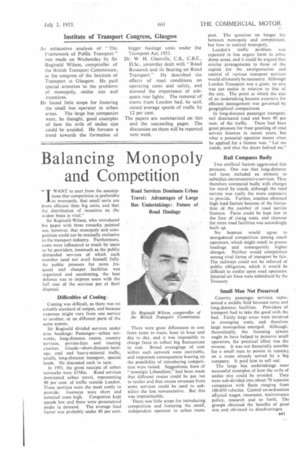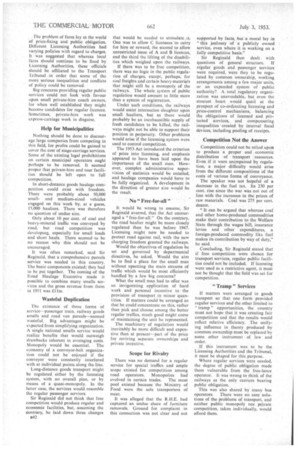Balancing Monopoly and Competition
Page 99

Page 100

If you've noticed an error in this article please click here to report it so we can fix it.
Road Services Dominate Urban Travel: Advantages of Large Bus Undertakings: Future of Road Haulage CC IWANT to start from the assump
tions that competition is preferable to monopoly, that small units are more efficient than big units, and that the distribution of incentive on the widest basis is vital."
Sir Reginald Wilson, who introduced his paper with these remarks, pointed out, however, that monopoly and competition could not be mutually exclusive in the transport industry. Furthermore, costs were influenced as much by users as by providers, inasmuch as the public demanded services of which each member need not avail himself fully. As public pressure for more frequent and cheaper facilities was organized and unrelenting, the best defence was to impress users with the full cost of the services put at their disposal,
Difficulties of Costing.
Costing was difficult, as there was no reliable standard of output, and because expenses might vary from one service to another, or on different parts of the same system.
Sir Reginald divided services under nine headings: Passenger—urban networks, long-distance routes, country services, private-hire and touring coaches. Goods—short-distance haulage, coal and heavy-mineral traffic, smalls, long-distance transport, special loads. He discussed each in turn.
In 1951, the gross receipts of urban networks were £158m. Road services dominated urban travel, representing 90 per cent. of traffic outside London. These services were the most costly to provide. Journeys were short and terminal costs high. Congestion kept speeds low and there were pronounced peaks in demand. The average load factor was probably under 40 per cent.
There were great differences in cost from route to route, hour to hour and day to day, and it was impossible to charge fares to reflect big fluctuations in cost. Broad averagings of cost within each network were inevitable, and important consequences bearing on the possibility of introducing competition were raised. Suggestions, born of
nostalgic Liberalism," had been made that different routes could be put out to tender and that excess revenues from some services could be used to subsidize the less remunerative. But this was impracticable.
There was little scope for introducing competition and fostering the small, independent operator in urban trans
Rail Compares Badly Two artificial factors aggravated this pressure. One was that long-distance rail fares included an element to subsidize unremunerative services. They therefore compared badly with charges for travel by coach, although the road service was really the more expensive to provide. Further, coaches obtained high load factors because of the limitation of the number of road service licences. Fares could be kept low in the .face of rising costs, and clamour for extra road facilities was accordingly built up.
No busman would agree to unregulated competition among coach operators, which might result in poorer loadings and consequently higher charges. Neither would competition among rival forms of transport be fair. The railways could not be relieved of public obligation, which it would be difficult to confer upon road operators. Internal air lines were subsidized by the Treasury
Small Man Not Preserved
Country passenger services represented a middle field between town and long-distance facilities. Providers of transport had to take the good with the bad. Fairly large areas were involved in averaging costs, and therefore large monopolies emerged. Although, theoretically, the licensing system ought to have helped to preserve small operators, the practical effect was the reverse. It was not financially sensible for a small man to persist in running on a route already served by a big company. It paid him to sell out.
The large bus undertakings were successful examples of how the evils of undue size could be avoided. They were sub-divided into about 70 separate companies with fleets ranging from 100-850 vehicles. Central co-ordination affected wages, insurance, maintenance policy, research and so forth. The groups obtained the benefits of great size and obviated its disadvantages. The problem of fares lay in the world of price-fixing and public obligation. Different Licensing Authorities had varying policies with regard to charges. It was suggested that whereas local fares should continue to be fixed by Licensing Authorities, these officials should be affiliated to the Transport Tribunal in order that some of the more serious inequalities and conflicts of policy could be removed.
Big concerns providing regular public services could not look with favour upon small private-hire coach owners, for when well established they might become candidates for regular licences. Sometimes, private-hire work was express-carriage work in disguise.
Help for Municipalities
Nothing should be done to discourage large companies from competing in this field, for profits could be gained to cover the cost of stage-carriage services. Some of the existing legal prohibitions on certain municipal operators ought perhaps to be removed. It seemed proper that private-hire and tour facilities should be left open to full competition.
In short-distance goods haulage competition could exist with freedom. There were probably about 50,000 smalland medium-sized vehicles engaged on this work by, at a guess, 15,000 hauliers. There was therefore no question of undue size.
Only about 10 per cent. of coal and heavy-mineral traffic was conveyed by road, but road competition was developing, especially for small loads and short hauls. There seemed to be no reason why this should not be encouraged.
It was often remarked, said Sir Reginald, that a comprehensive parcels service was needed in this country. The basic components existed; they had to be put together. The coming of the Road Haulage Executive made it possible to combine many smalls services and the gross revenue from them in 1951 was £11m.
Wasteful Duplication The existence of three forms of service--passenger train, railway goods smalls and road van parcels—seemed wasteful. Big advantages might be expected from simplifying organization. A single national smalls service would realize benefits that would outweigh drawbacks inherent in averaging costs. Monopoly would be essential. The economy of a conveyor-belt organization could not be enjoyed if the conveyor were constantly interfered with at individual points along the line.
Long-distance goods transport might be regulated either by the licensing system, with no overall plan, or by means of a quasi-monopoly. In the latter case, the services would resemble the regular passenger services.
Sir Reginald did not think that free competition would produce regular and economic facilities, but, assuming the contrary, he laid down three changes n42
that would be needed to stimulate ,it. One was to allow C licensees to carry for hire or reward, the second to allow unrestricted issue of A and B licences, and the third the lifting of the disabilities which weighed upon the railways.
If there was to be free competition, there was no logic in the public regulation of charges, except, perhaps, for coal freights and certain heavy materials that might still be a monopoly of the railways. The whole system of public regulation would amount to little more than a system of registration.
Under such conditions, the railways would assist internecine slaughter upon small hauliers, but as there would probably be an inexhaustible supply of fresh candidates to be killed, the railways might not be able to support their position in perpetuity. Other problems would arise if the licensing system were used to control competition.
The 1953 Act introduced the criterion of price into licensing, and emphasis appeared to have been laid upon the importance of the small man. However, complex administrative supervision of statistics would be entailed, and haulage companies would have to be fully organized. A development in the direction of greater size would be the result.
No "Free-for-all"
It would be wrong to assume, Sir Reginald averred, that the Act encouraged a "free-for-all." On the contrary, the road haulier might be more closely regulated than he was before 1947. Licensing might now be needed to protect road against rail, with the new charging freedom granted the railways.
Would the objectives of regulation be set and governed by departmental directives, he asked. Would the aim be to find a place for the small man without upsetting the main streams of traffic which would be most efficiently handled by a few big concerns?
What the small man had to offer was an invigorating application of hard work and personal incentive to the provision of transport in minor quantities. If matters could be arranged so that he could concentrate on this, rather than pick and choose among the better regular traffics, much good might come of maintaining the unit he represented.
The machinery of regulation would inevitably be more difficult and expensive than at present—part of the price for reviving separate ownerships and private incentive.
Scope for Rivalry There was no demand for a regular service for special traffics and ample scope existed for competition among road operators. Monopolies had evolved in certain trades. The meat pool existed because. the Ministry of Food were the sole transporters of meat.
It was alleged that the R.H.E. had captured an undue share of furniture removals. Ground for complaint in this connection was not clear and not supported by facts, but a moral lay in "this jealousy of a publicly owned service, even where it is working on a fully competitive basis."
Sir Reginald then dealt. with questions of general structure. If regular goods and passenger services were required, were they to be regulated by common ownership, working arrangements among a few major units, or an expanded system of public authority? A total regulatory organization was unavoidable, but even the stoutest heart would quail at the prospect of co-ordinating licensing and price-control mechanisms, balancing the obligations of licensed and protected =vices, and compensating inequalities created by internal fiscal devices, including pooling of receipts.
Competition Not the Answer
Competition could not be relied upon to produce a proper and economic distribution of transport resources. Even if it were unimpaired by regulation, a major difficulty would arise from the different compositions of the costs of various forms of conveyance.
The speaker was not hopeful of a decrease in the fuel tax. Its 230 per cent. rise since the war was not out of line with the increases in the prices of raw materials. Coal was 275 per cent. dearer.
"It can be argued that whereas coal and other home-produced commodities make their contribution to the Welfare State through the wages bill, insurance levies and other expenditures, a foreign-produced commodity like fuel makes its contribution by way of duty," he said.
Concluding, Sir Reginald stated that if free competition were chosen for transport services, regular public facilities could not be included. If licensing were used as a restrictive agent, it must not be thought that the field was set for competition.
" Tramp " Services
If matters were arranged in goods transport so that one form provided regular services and the other limited to " tramp " opportunities, the country must not hope that it was creating fair competition and that the results would reflect relative efficiency. The unifying influence in theory produced by common ownership must be replaced by some other instrument of law and order.
If this instrument was to be the Licensing Authorities and the Tribunal, it must be shaped for this purpose.
Where regular services were needed, the degree of public obligation made them vulnerable from the free-lance operator. It was wrong to think of the railways as the only carriers bearing public obligation.
This was also shared by many bus operators. There were no easy solutions of the problems of transport, and neither public monopoly nor private competition, taken individually, would afford them.




























































































































































